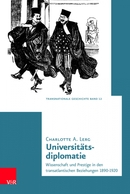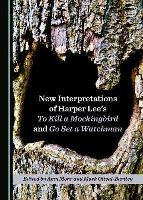Publications 2019-2022
Lerg, Charlotte A. Die Amerikanische Revolution. 2. aktual. u. erg. Aufl. Tübingen: Narr Francke Attempto, 2022
Mauch, Christof. Paradise Blues: Reisen in die Natur und die Geschichte der USA. München: dtv 2022.
Manlio Della Marca and Uwe Lübken, editors. Rivers of the Americas. Special issue of the Review of International American Studies (RIAS), vol. 14, no. 1, 2021.
Ursula Prutsch: Populismus in den USA und Lateinamerika. Hamburg: VSA Verlag, 2019.
Charlotte A. Lerg , Johan Östling and Jana Weiß, editors. History of Intellectual Culture. Participatory Knowledge. De Gruyter Oldenbourg, 2022.
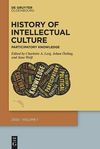 With concepts of participation discussed in multiple disciplines from media studies to anthropology, from political sciences to sociology, the first issue of the new yearbook History of Intellectual Culture (HIC) dedicates a thematic section to the way knowledge can and arguably must be conceptualized as "participatory".
With concepts of participation discussed in multiple disciplines from media studies to anthropology, from political sciences to sociology, the first issue of the new yearbook History of Intellectual Culture (HIC) dedicates a thematic section to the way knowledge can and arguably must be conceptualized as "participatory".
Introducing and exploring "participatory knowledge", the volume aims to draw attention to the potential of looking at knowledge formation and circulation through a new lens and to open a dialogue about how and what concepts and theories of participation can contribute to the history of knowledge. By asking who gets to participate in defining what counts as knowledge and in deciding whose knowledge is circulated, modes of participation enter into the examination of knowledge on various levels and within multiple cultural contexts.
The articles in this volume attest to the great variety of approaches, contexts, and interpretations of "participatory knowledge", from the sociological projects of the Frankfurt School to the Uppsala-based Institute for Race Biology, from the Argentinian National Folklore Survey to current hashtag activism and Covid-19-archive projects. HIC sees knowledge as rooted in social and political structures, determined by modes of transfer and produced in collaborative processes. The notion of "participatory knowledge" highlights in a compelling way how knowledge is rooted in cultural practices and social configurations.
Christof Decker. Imaging the Scenes of War. Aesthetic Crossovers in American Visual Culture. Transcript Verlag, 2022
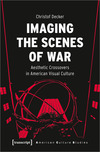 In American visual culture, the 1930s and 1940s were a key transitional period shaped by the era of modernism and the global confrontation of World War II. Christof Decker demonstrates that the war and its iconography of destruction challenged visual artists to find new ways of representing its consequences. Dealing with trauma and war crimes led to the emergence of complex aesthetic forms and media crossovers. Decker shows that the 1940s were a pivotal period for the creation of horrific yet also innovative representations that boosted American visual modernism and set the stage for debates about the ethics of visual culture in the post-9/11 era.
In American visual culture, the 1930s and 1940s were a key transitional period shaped by the era of modernism and the global confrontation of World War II. Christof Decker demonstrates that the war and its iconography of destruction challenged visual artists to find new ways of representing its consequences. Dealing with trauma and war crimes led to the emergence of complex aesthetic forms and media crossovers. Decker shows that the 1940s were a pivotal period for the creation of horrific yet also innovative representations that boosted American visual modernism and set the stage for debates about the ethics of visual culture in the post-9/11 era.
Lerg, Charlotte A. Die Amerikanische Revolution. 2. aktual. u. erg. Aufl. Tübingen: Narr Francke Attempto, 2022
 Die Amerikanische Revolution war eine der größten Umwälzungen der Moderne. Begriffe und Theorien jener Zeit prägen bis heute das Selbstverständnis der USA. Dieses Buch liefert einen konzisen Überblick über die historischen Ereignisse: von den ersten Unruhen über den Unabhängigkeitskrieg bis zur Staatsgründung (ca. 1763–1793). Darüber hinaus werden die Geschehnisse kulturell eingeordnet. Problematisiert wird auch das unlösbare Spannungsverhältnis von Freiheitsstreben und Sklaverei sowie das Erbe der Revolution in der aktuellen Politik und Erinnerungskultur der Vereinigten Staaten von Amerika.
Die Amerikanische Revolution war eine der größten Umwälzungen der Moderne. Begriffe und Theorien jener Zeit prägen bis heute das Selbstverständnis der USA. Dieses Buch liefert einen konzisen Überblick über die historischen Ereignisse: von den ersten Unruhen über den Unabhängigkeitskrieg bis zur Staatsgründung (ca. 1763–1793). Darüber hinaus werden die Geschehnisse kulturell eingeordnet. Problematisiert wird auch das unlösbare Spannungsverhältnis von Freiheitsstreben und Sklaverei sowie das Erbe der Revolution in der aktuellen Politik und Erinnerungskultur der Vereinigten Staaten von Amerika.
Flügge, Anna, Tommasi, Giorgia. Perspectives on Homelessness. American Studies – A Monograph Series, Volume 314. Heidelberg: Winter, 2022
 As growing economic and racial inequality continues to shape American society, homelessness remains an urgent issue. Embedded in American history, and more recently exacerbated by the 2008 financial and housing crisis, a new wave of homelessness has emerged as the U.S. has faced surging evictions throughout the COVID-19 pandemic. The essays in this volume explore homelessness both as the literal state of being unsheltered and as the modern and contemporary condition of being and/or feeling estranged from society.
As growing economic and racial inequality continues to shape American society, homelessness remains an urgent issue. Embedded in American history, and more recently exacerbated by the 2008 financial and housing crisis, a new wave of homelessness has emerged as the U.S. has faced surging evictions throughout the COVID-19 pandemic. The essays in this volume explore homelessness both as the literal state of being unsheltered and as the modern and contemporary condition of being and/or feeling estranged from society.
They also reflect on the meaning of home in relation to race, class, gender, migration and mobility in an American and transnational context. Contributions include interdisciplinary research that investigates representations of home and homelessness in modern and contemporary fiction, film, and videogames, as well as philosophical, historical, political and architectural discussions of homelessness.
Mauch, Christof. Paradise Blues: Reisen in die Natur und die Geschichte der USA. München: dtv 2022.
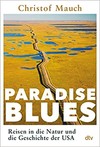 A fresh new, eminently insightful look at America and a brilliant melding of travel narrative, social portrait and historiography
A fresh new, eminently insightful look at America and a brilliant melding of travel narrative, social portrait and historiography
Christof Mauch lived in the United States for fifteen years, during which time he criss-crossed the country over and over again. His attention was always drawn to the breathtakingly beautiful stretches of land and the deep wounds that humans have inflicted on nature over the past two hundred years. Mauch presents us with an America that goes beyond the postcard-perfect images of national parks and mega-city street canyons. His America is that of a people defined by internal divisions, which worships nature and yet ruthlessly destroys it. He tells the stories of the people who have learned to live with the scars and of those who now choose to powerfully resist the further destruction of their environment.
Mauch, Christof. Die Präsidenten der USA: 46 historische Portraits von George Washington bis Joe Biden. München: C.H. Beck, 2021.
 Von George Washington bis Joe Biden bietet dieser Band eine kleine Geschichte der USA im Spiegel ihrer Präsidenten. Die Autorinnen und Autoren schildern in 46 biographischen Porträts Leben und Amtszeit der US-Präsidenten, skizzieren die wichtigsten Entwicklungen, Ereignisse und Entscheidungen und betrachten abschließend Leistungen und Versäumnisse der jeweiligen Präsidentschaft. So ist zugleich ein Panorama der US-amerikanischen Geschichte von der Unabhängigkeit am Ende des 18. Jahrhunderts bis zur globalen Supermacht unserer Tage entstanden.
Von George Washington bis Joe Biden bietet dieser Band eine kleine Geschichte der USA im Spiegel ihrer Präsidenten. Die Autorinnen und Autoren schildern in 46 biographischen Porträts Leben und Amtszeit der US-Präsidenten, skizzieren die wichtigsten Entwicklungen, Ereignisse und Entscheidungen und betrachten abschließend Leistungen und Versäumnisse der jeweiligen Präsidentschaft. So ist zugleich ein Panorama der US-amerikanischen Geschichte von der Unabhängigkeit am Ende des 18. Jahrhunderts bis zur globalen Supermacht unserer Tage entstanden.
Manlio Della Marca and Uwe Lübken, editors. Rivers of the Americas. Special issue of the Review of International American Studies (RIAS), vol. 14, no. 1, 2021.
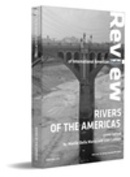 Over the past three decades, rivers have become a fascinating and popular subject of scholarly interest, not only in the field of environmental history, where river histories have developed into a distinct subgenre, but also in the emerging field of environmental humanities. In this scholarship, rivers have often been reconceptualized as socio-natural sites where human and non-human actors interact with the natural world, generating complex legacies, path dependencies, and feedback loops. Furthermore, rivers have been described as hybrid “organic machines,” whose energy has been utilized by humans in many different ways, including the harvesting of both hydropower and salmon. Indeed, as several environmental historians have noted, in many regions of the world, watercourses have been transformed by technology to such an extent that they increasingly resemble enviro-technical assemblages rather than natural waterways. Rivers have also been discussed through the lens of “eco-biography,” a term coined by Mark Cioc in his influential monograph on the Rhine River, a book informed by “the notion that a river is a biological entity—that it has a ‘life’ and ‘a personality’ and therefore a ‘biography’.” Quite surprisingly, despite this “river turn” (to use Evenden's phrase), rivers have played a marginal role in recent American Studies scholarship. To address this gap, this issue of RIAS brings together scholars from different disciplines, countries, and continents to analyze a wide variety of river experiences, histories, and representations across the American hemisphere and beyond. Hence the title of this volume, Rivers of the Americas, should be seen as both an allusion to the Rivers of America book series (a popular series of sixty-five volumes, each on a particular US river, published between 1937 and 1974) and as a reminder of the still untapped potential of hemispheric, transnational, and comparative modes of critical engagement with rivers in American Studies.
Over the past three decades, rivers have become a fascinating and popular subject of scholarly interest, not only in the field of environmental history, where river histories have developed into a distinct subgenre, but also in the emerging field of environmental humanities. In this scholarship, rivers have often been reconceptualized as socio-natural sites where human and non-human actors interact with the natural world, generating complex legacies, path dependencies, and feedback loops. Furthermore, rivers have been described as hybrid “organic machines,” whose energy has been utilized by humans in many different ways, including the harvesting of both hydropower and salmon. Indeed, as several environmental historians have noted, in many regions of the world, watercourses have been transformed by technology to such an extent that they increasingly resemble enviro-technical assemblages rather than natural waterways. Rivers have also been discussed through the lens of “eco-biography,” a term coined by Mark Cioc in his influential monograph on the Rhine River, a book informed by “the notion that a river is a biological entity—that it has a ‘life’ and ‘a personality’ and therefore a ‘biography’.” Quite surprisingly, despite this “river turn” (to use Evenden's phrase), rivers have played a marginal role in recent American Studies scholarship. To address this gap, this issue of RIAS brings together scholars from different disciplines, countries, and continents to analyze a wide variety of river experiences, histories, and representations across the American hemisphere and beyond. Hence the title of this volume, Rivers of the Americas, should be seen as both an allusion to the Rivers of America book series (a popular series of sixty-five volumes, each on a particular US river, published between 1937 and 1974) and as a reminder of the still untapped potential of hemispheric, transnational, and comparative modes of critical engagement with rivers in American Studies.
Benesch, Klaus: Mythos Lesen. Buchkultur und Geisteswissenschaften im Informationszeitalter. transcript Verlag, 2021.
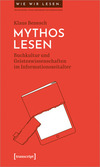 Die Gründe für den rasanten Prestigeverlust von Buchkultur und Geisteswissenschaften sind vielfältig. Niemand weiß, wie die Zukunft des Lesens tatsächlich aussehen wird. Dennoch lassen sich einige Antworten aus den Entwicklungen seit der Jahrtausendwende extrapolieren. Um ein breites Spektrum unterschiedlicher Positionen zu Wort kommen zu lassen, nimmt Klaus Benesch das Thema nicht nur aus Sicht der Leseforschung und der Literaturwissenschaften in den Blick. Das Fragen nach der sich wandelnden Rolle des Lesens und der Geisteswissenschaften im Informationszeitalter verlangt auch nach der Ausweitung der Perspektive in den Bereich der Gesellschafts- und Wissenschaftspolitik. Neue Selbstbilder der Geisteswissenschaften sind nötig, die die Kulturtechnik des Lesens in Zeiten der Digitalisierung auf neuartige Weise zeitgemäß und nachhaltigerschließen.
Die Gründe für den rasanten Prestigeverlust von Buchkultur und Geisteswissenschaften sind vielfältig. Niemand weiß, wie die Zukunft des Lesens tatsächlich aussehen wird. Dennoch lassen sich einige Antworten aus den Entwicklungen seit der Jahrtausendwende extrapolieren. Um ein breites Spektrum unterschiedlicher Positionen zu Wort kommen zu lassen, nimmt Klaus Benesch das Thema nicht nur aus Sicht der Leseforschung und der Literaturwissenschaften in den Blick. Das Fragen nach der sich wandelnden Rolle des Lesens und der Geisteswissenschaften im Informationszeitalter verlangt auch nach der Ausweitung der Perspektive in den Bereich der Gesellschafts- und Wissenschaftspolitik. Neue Selbstbilder der Geisteswissenschaften sind nötig, die die Kulturtechnik des Lesens in Zeiten der Digitalisierung auf neuartige Weise zeitgemäß und nachhaltigerschließen.
Mauch, Christof, mit Anke Ortlepp, Jürgen Heideking. Geschichte der USA. 7. aktual. Aufl. Tübingen: Narr Francke Attempto, 2020
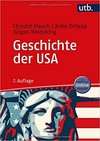 Die Neuauflage des Klassikers zur Geschichte der Vereinigten Staaten bietet einen Überblick der Ereignisse und Entwicklungen bis ins Jahr 2020.
Die Neuauflage des Klassikers zur Geschichte der Vereinigten Staaten bietet einen Überblick der Ereignisse und Entwicklungen bis ins Jahr 2020.
Sozial- und kulturgeschichtliche Themen treten neben die Darstellung von Politik, Wirtschaft und Verfassung vor dem Hintergrund einer weltpolitischen Lage, die sich in den letzten 20 Jahren entscheidend verändert hat und zu einer Neubewertung der Rolle der USA als Weltmacht Anlass gibt. Besondere Beachtung finden die Rassenproblematik, ethnische, religiöse und Umweltfragen, Einwanderung sowie die Rolle der Frauen und die deutschamerikanischen Beziehungen. Die Fülle von Fakten und Analysen verbindet der Band mit den Mitteln narrativer Geschichtsschreibung zu einer differenzierten, gut lesbaren Darstellung auf aktuellem Forschungsstand. Die neue kommentierte Bibliographie diskutiert Standardwerke wie auch aktuelle Literatur.
Mauch, Christof: “Slow Hope: Rethinking Ecologies of Crisis and Fear,” RCC Perspectives: Transformations in Environment and Society 2019, no. 1.
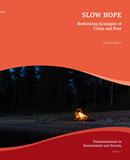
In this essay, Christof Mauch sets out his concept of “slow hope.” Departing from Rob Nixon’s concept of “slow violence”—which describes the gradual, almost invisible nature of much environmental damage—Mauch highlights the mostly untold stories of quiet but positive environmental change that are often hiding in plain sight. The search for environmental hope does not downplay the magnitude of the problems we are facing, nor is it synonymous with unadulterated optimism. Yet, as Mauch shows, it is possible to look to hopeful narratives as alternatives to stories of decline—narratives which can help us to think creatively and act courageously in these times of converging ecological, social, and economic crises.
Heike Paul, Ursula Prutsch, Jürgen Gebhardt (Ed.): The Comeback of Populism. Transatlantic Perspectives. Heidelberg: Universitätsverlag Winter 2019.

“Populism” is a fuzzy term. It neither identifies a specific political program nor does it clearly situate political positions along a left-to-right spectrum. Instead, it refers to a strategy of communication and a style of political performance. This volume sheds light on the resurgence of populism in the United States, Europe, and Latin America. Contemporary populisms need to be understood in their cultural and political specificities as well as in their global interrelation and outreach. They often share an authoritarianism along with anti-establishment resentments while posing as expressing the ‘voice of the people.’ Real or imagined scenarios of threat are met with a rhetoric of emancipation from victimization, yet this emancipatory zeal is couched in a rhetoric of exclusion and, even, nativism. Frank Decker, Akwugo Emejulu, D.S. Hillygus, Michael Hochgeschwender, Donatella Izzo, Carlos de la Torre, and Hans Vorländer (et al.) examine populism’s simplifications and mystifications.
Ursula Prutsch: Populismus in den USA und Lateinamerika. Hamburg: VSA Verlag, 2019.
Populismus ist anpassungsfähig – weshalb und unter welchen Umständen entfaltet er solche Wirkmächtigkeit und wie können populistische Strömungen eingedämmt werden? Eine Analyse mit dem vergleichenden Blick auf die USA und sechs lateinamerikanische Staaten.
Donald Trump, Juan und Eva Perón, Hugo Chávez, Evo Morales, um nur einige Vertreter*innen zu nennen – Populismus ist ein vielfältiges Phänomen. Die Debatten in den letzten Jahren befassten sich unter anderem mit der Frage, ob dem globalen rechtspopulistischen Trend als Abwehrstrategie ein »linker Populismus« entgegenzusetzen sei. Dabei blickte man vor allem auf Venezuela, Bolivien und Ecuador. Ursula Prutsch analysiert ausgehend vom frühen 19. Jahrhundert unterschiedliche Populismen in ihren regionalen Varianten und historischen Dimensionen und wirft einen vergleichenden Blick auf den Norden und Süden Amerikas. Dargestellt werden anhand von sieben Ländern Parteien oder Bewegungen, die so dominant wurden, dass sie an die Macht kamen oder die nationale Politik entscheidend beeinflussen: in den USA, Brasilien, Argentinien, Peru, Venezuela, Ecuador und Bolivien. Die Autorin geht davon aus, dass Populismus ein Bündel von Herrschafts- elementen ist. Obgleich flexibel und anpassungsfähig, haben populistische Politik und die Gründe ihres Entstehens gemeinsame Charakteristika, die herausgearbeitet werden, insbesondere bezogen auf ökonomische Bedingungen, politische Konfliktsituationen und kulturelle Ausdrucksformen.
Charlotte A. Lerg. Universitätsdiplomatie. Wissenschaft und Prestige in den transatlantischen Beziehungen, 1890-1920. Göttingen: Vandenhoeck&Ruprecht, 2019.
Warum bringen sich Universitäten in die Internationale Politik ein? Die kurze Antwort: Prestige. In den deutsch-amerikanischen Beziehungen vor dem ersten Weltkrieg wird dies erstmals deutlich erkennbar. Die Anfänge der deutschen Kulturdiplomatie nahmen Amerika gezielt in den Blick. In den USA, wo der diplomatische Dienst sich erst gerade zu professionalisieren begann, fehlte jedoch eine korrespondierende Struktur. Zeitgleich versuchten die amerikanischen Universitäten nach einem Expansionsschub ihre Rolle in der Gesellschaft neu zu definieren. Internationale Sichtbarkeit und Anerkennung boten ein hohes Legitimationspotential. Seit dem 19. Jahrhundert war das akademische Deutschland ein positiver Referenzpunkt in der Entwicklung der amerikanischen Forschungsuniversitäten, eine Kooperation war also attraktiv. Damit entstand die amerikanische Universitätsdiplomatie.
Die Studie untersucht die Verquickung von akademischer Welt und diplomatischem Parkett. Sie zeigt anhand von Ehrendoktorwürde, Campusbesuchen, Austauschprogrammen und Institutionsgründungen, dass Universitäten nicht etwa von der Kulturpolitik instrumentalisiert wurden, sondern sich vielmehr selbst in Position brachten und eine eigene Agenda verfolgten. Mit der Zäsur des ersten Weltkriegs fanden die Deutschlandbeziehungen amerikanischer Akademiker ein jähes Ende. Was blieb waren Erfahrungen mit universitätsdiplomatischen Praktiken, die – inzwischen global ausgerichtet – bis heute Gültigkeit haben. Sie verhalfen den einflussreichen US-Forschungsuniversitäten zu internationalem Prestige weit über ihren wissenschaftlichen Ruf hinaus.
Amy Mohr and Mark Olival-Bartley, editors. New Interpretations of Harper Lee's To Kill a Mockingbird and Go Set a Watchman. Cambridge Scholars Publishing, 2019.
Featuring essays from an international group of scholars, this volume addresses Harper Lee's To Kill a Mockingbird (1960), the American literary classic, and her controversial Go Set a Watchman (2015). The contributions include productive new interpretations from diverse critical angles, including US literary and cultural history, Southern studies, sociological theory, gender studies, stylistic analysis, translation, and pedagogy. With a balance of critical analysis and pedagogical approaches, this provocative book will prove to be of particular interest to scholars seeking to reconcile the points of divergence in these two works. For educators at the secondary and university levels, the collection also offers current resources and perspectives on Lee's novels.



